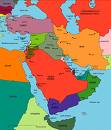“Color Revolutions”: US State Department Document Confirms Regime Change Agenda in the Middle East

The Obama Administration has been pursuing a policy of covert support for the Muslim Brotherhood and other insurgent movements in the Middle East since 2010. MEB has obtained a just-released U.S. State Department document through a Freedom of Information Act lawsuit that confirms the Obama Administration’s pro-active campaign for regime change throughout the Middle East and North Africa region.
The October 22, 2010 document, titled “Middle East Partnership Initiative: Overview,” spells out an elaborate structure of State Department programs aimed at directly building “civil society” organizations, particularly non-governmental organizations (NGOs), to alter the internal politics of the targeted countries in favor of U.S. foreign policy and national security objectives.
The five-page document, while using diplomatic language, makes clear that the goal is promoting and steering political change in the targeted countries:
“The Middle East Partnership Initiative (MEPI) is a regional program that empowers citizens in the Middle East and North Africa to develop more pluralistic, participatory, and prosperous societies. As the figures in this overview illustrate, MEPI has evolved from its origins in 2002 into a flexible, region-wide tool for direct support to indigenous civil society that mainstreams that support into the daily business of USG diplomacy in the region. MEPI engages all the countries of the NEA region except Iran. In the seven of NEA’s eighteen countries and territories with USAID missions, country-level discussions and communication between MEPI and USAID in Washington ensure that programming efforts are integrated and complementary.”
In a section of the document titled “How MEPI Works,” three core elements of the program were spelled out: region-wide and multi-country programming, local grants, and country-specific projects. The objectives of the region-wide and multi-country programming were described as:
“builds networks of reformers to learn from and support one another, and to catalyze progressive change in the region.” The local grants “provide direct support to indigenous civic groups, and now represent more than half of MEPI’s projects.”
Under the country-specific aspect of the program, designated officers of the U.S. embassies manage the funding and work as direct liaisons to the various funded local NGOs and other civil society groups. The “country-specific projects” are tasked “to respond to local developments and local needs, as identified by our embassies, local reformers, and our own field analysis. Political developments in a country may produce new opportunities or challenges for USG policy goals, and MEPI will shift funds to respond to these needs.”
According to the October 2010 document, the Deputy Chief of Mission (DCM) at every U.S. embassy in the MENA (Middle East/North Africa) is in charge of the MEPI program, giving it a clear high priority. The document makes clear that the Middle East Partnership Initiative is not coordinated with host governments:
“MEPI works primarily with civil society, through NGO implementers based in the United States and in the region. MEPI does not provide funds to foreign governments, and does not negotiate bilateral assistance agreements. As a regional program, MEPI can shift funds across countries and to new issue-areas as needed.”
The document makes clear that special priority, as early as 2010, was given to Yemen, Saudi Arabia, Tunisia, Egypt and Bahrain, and that project headquarters in Abu Dhabi and Tunis were overall coordinating centers for the entire regional program. Within a year of its inception, Libya and Syria were added to the list of countries on the priority list for civil society intervention.
The State Department document was released as part of an FOIA suit focused on Presidential Study Directive 11, which remains classified “secret” and has not yet been released to the public. According to MEB sources, PSD-11 spelled out the Obama Administration’s plans to support the Muslim Brotherhood and other allied “political Islam” movements believed at the time to be compatible with U.S. foreign policy objectives in the region.
The MEPI is currently directed by Paul Sutphin, who was previously U.S. consul general in Erbil, Iraq and more recently, Director of the Office of Israel and Palestinian Affairs at the State Department’s Bureau of Near Eastern Affairs. His deputy is Catherin Bourgeois, who was first assigned to MEPI in February 2009 as Division Chief of Policy and Programming. Her past State Department assignments have involved the development of Information Technology uses in advancing U.S. foreign policy goals.
Two other senior State Department officials have overseen the development and expansion of the program since the drafting of the October 2010 MEPI document, spelling out its transformation into a regime-change force. Tomicah S. Tillemann is the Senior Advisor for Civil Society and Emerging Democracies, appointed to that post by then-Secretary of State Hillary Clinton in October 2010. He remains in that post under Secretary John Kerry. He was the founder of the Lantos Foundation for Human Rights and Justice, itself an NGO named after Tilleman’s grandfather, the former U.S. Congressman, Tom Lantos.
In September 2011, Ambassador William B. Taylor was appointed to head the then-newly established Office of the Special Coordinator for Middle East Transitions, after having served as the U.S. Ambassador to Ukraine during the “Orange Revolution” of 2006-2009. According to a State Department paper,
“The Office of the Special Coordinator for Middle East Transitions (D/MET), established in September 2011, coordinates United States Government assistance to incipient democracies arising from popular revolts across the Middle East and North Africa (MENA) region. The Special Coordinator for Middle East Transitions implements a coordinated interagency strategy to support designated MENA countries undergoing transitions to democracy—currently, Egypt, Tunisia, and Libya.”
The complete State Department documents released under the FOIA will soon be available as part of a comprehensive MEB Special Report now in production on the regime-change program and its consequences for the region. For upcoming details on this report, check the MEB website.
Copyright Middle East Briefing 2014

